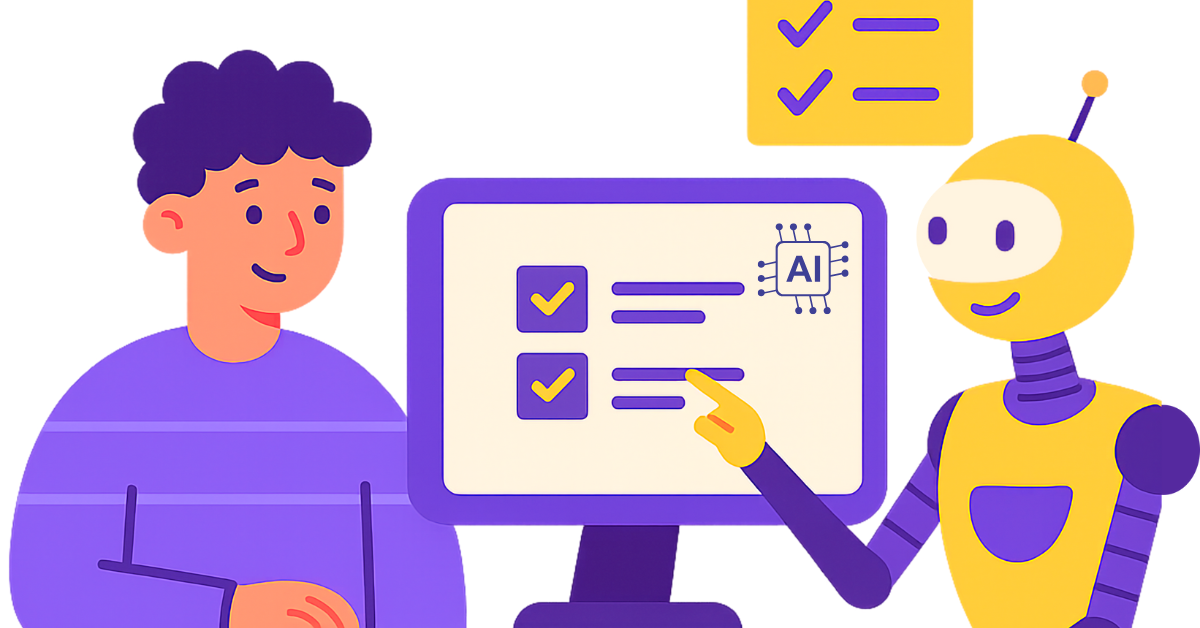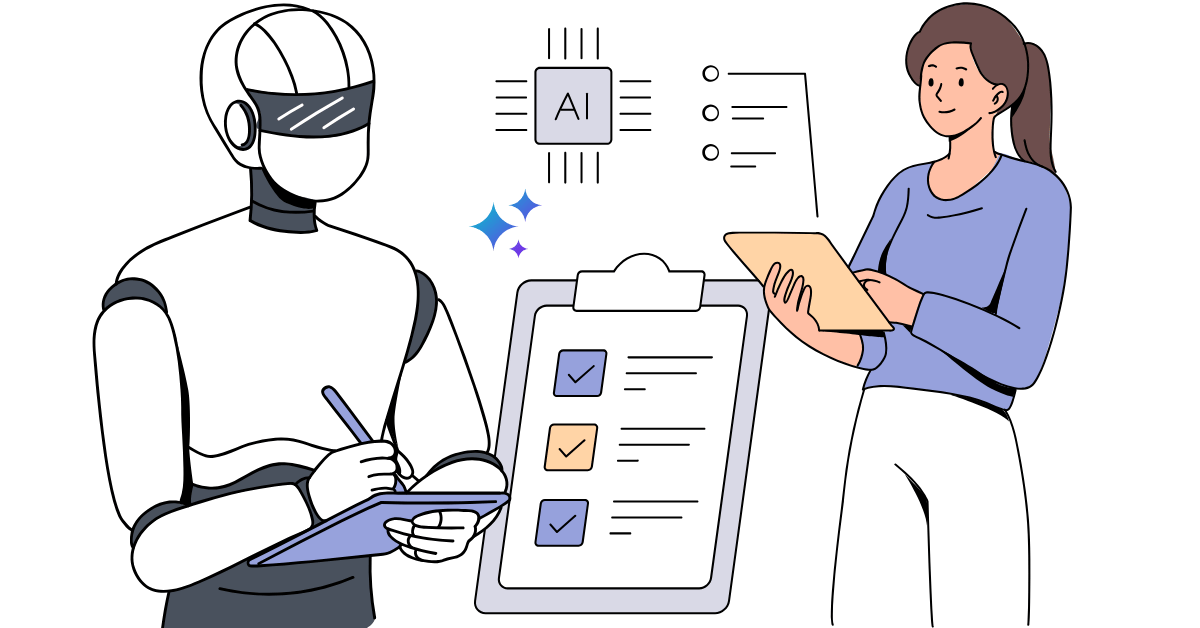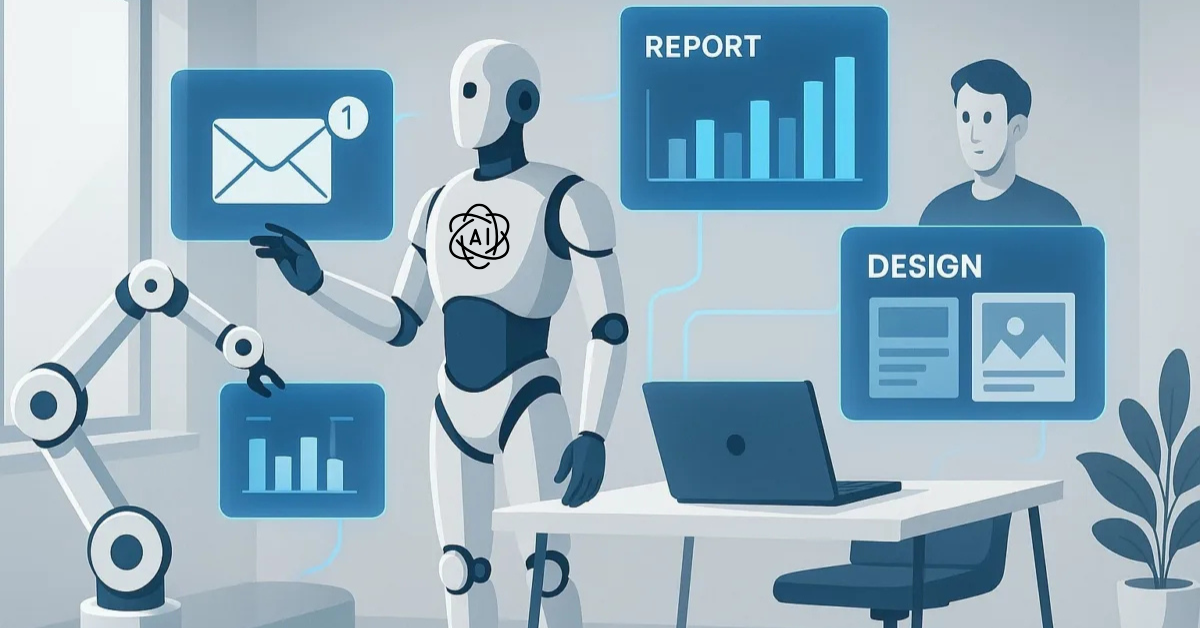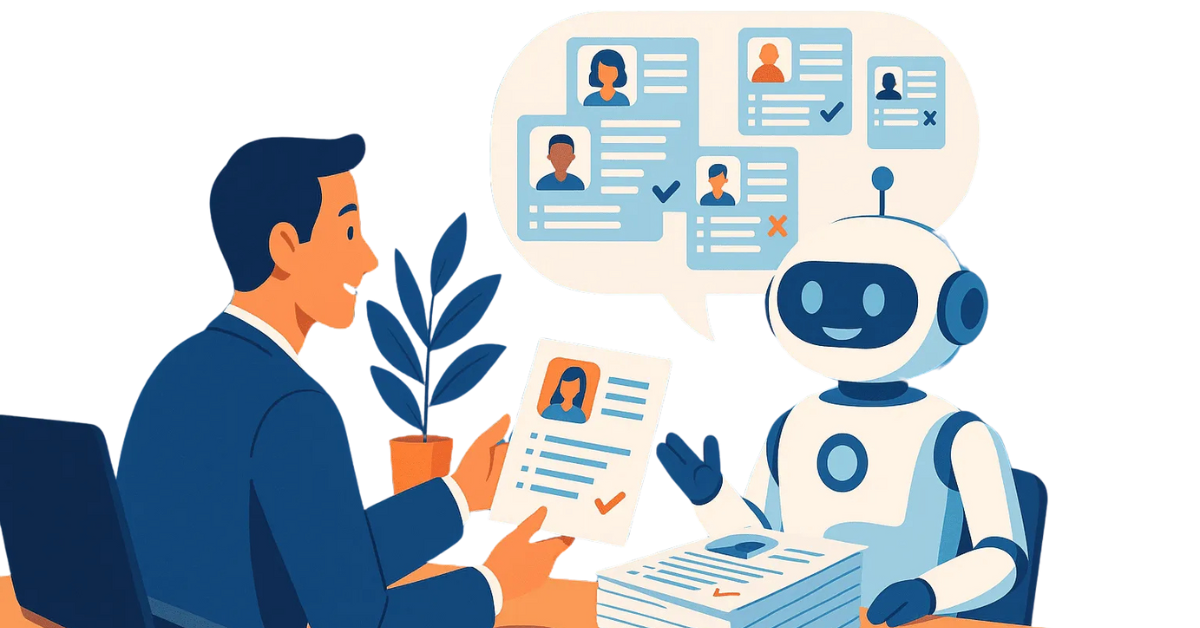Artificial intelligence has been making waves in recruitment for years, but until recently it felt like a luxury reserved for the Fortune 500. From automated resume screeners to one-way video interviews scored by algorithms, these high-tech hiring tools were initially adopted by big corporations with deep pockets and massive hiring needs.
In fact, 93% of Fortune 500 Chief Human Resource Officers report they’ve begun integrating AI into their hiring processes , and nearly 99% of Fortune 500 companies use some form of AI-driven hiring tool (usually an ATS or assessment platform) . These enterprises led the charge, using AI to sift through thousands of applications, speed up hiring by weeks, and even predict candidate success. But what about everyone else?
Smaller businesses watched these developments from the sidelines. For a long time, advanced hiring tech just wasn’t built for them. Early AI hiring platforms came with hefty price tags, complex integrations, and one-size-fits-all workflows that only a large HR department could love.
The good news is that’s changing fast. The industry is now shifting toward democratization, making AI-powered hiring accessible to startups, mid-sized companies, and lean HR teams that want the benefits of AI without the Fortune 500 budget or bureaucracy.
Big Companies Blazed the Trail in AI Hiring
It’s easy to see why large enterprises were the first to leverage AI in recruitment. They face enormous hiring volumes – think of Google receiving 75,000 applications per week – which practically forced them to automate. Using AI was a matter of survival to avoid drowning in resumes. Giants like Unilever and Hilton have famously deployed AI hiring tools to great effect. Hilton Hotels, for example, reported a 90% reduction in time-to-fill positions after using AI for resume screening and interview scheduling. When you’re filling hundreds or thousands of roles, those efficiency gains are game-changing.
Fortune 500 companies also had the resources to experiment early. They poured money into AI-driven automated interviewing platforms (where an algorithm asks candidates questions on video), AI based assessments (like gamified tests scored by machine learning), and smart candidate matching systems that comb databases for the perfect fit.
By 2025, this led to near-universal uptake among big corporations – 87% of all companies were using AI in at least one part of recruiting, and essentially all Fortune 500 firms utilize AI-assisted methods in hiring . These employers proved that AI could streamline hiring: reducing bias, improving quality-of-hire, and saving costs in the long run. However, the cutting-edge tech often came with cutting-edge complexity and costs that smaller organizations struggled to justify.
Why Smaller Businesses Struggled to Adopt AI Hiring Tools
For small and mid-sized businesses (SMBs), the promise of AI in hiring has always been enticing – who wouldn’t want to automate tedious hiring tasks and hire like Google if they could? But several hurdles historically kept AI recruitment tech out of reach for SMBs:
High Costs
Many early AI hiring solutions were enterprise software with enterprise pricing. Subscription fees, implementation costs, and customization packages often ran into tens or hundreds of thousands of dollars – well beyond an SMB’s budget. It’s no wonder surveys found limited budgets and the high cost of AI technologies as the top barrier to adoption for smaller businesses.
Tight margins meant 45% of small companies avoided investing in AI due to cost concerns . Until recently, if you weren’t a Fortune 500 with a giant HR budget, cutting-edge hiring AI simply wasn’t affordable.
Complexity & Expertise
Even if cost wasn’t an issue, early AI systems could be complex to implement and operate. Many required integration with existing HR software or training on company data. Small companies often lack dedicated IT or data science teams to wrangle these systems. As one analysis noted, SMEs often “don’t have the tech experts” on staff and find the AI landscape confusing. The “black box” complexity of AI – not knowing how an algorithm makes decisions – also felt risky for a small firm where each hire is critical . In short, the technical expertise gap made sophisticated AI tools intimidating for lean HR teams.
Lack of Customization
Early HR tech was built with large organizations in mind. The workflows, question templates, and algorithms were geared toward high-volume recruiting. Smaller businesses found that many tools weren’t flexible enough to fit their personalized approach or lower hiring volumes.
For example, an AI interview platform might assume you have a constant pipeline of candidates and standardized roles to fill, which isn’t true for a five-person startup hiring its first engineer. Without the ability to easily customize questions, criteria, or scale down processes, SMBs felt these tools didn’t “get” their needs. Many therefore stuck to manual hiring or basic software, preferring a human touch over a clunky tool misaligned with their scale.
The result of these barriers was a stark adoption gap. While Fortune 500s forged ahead, most smaller companies remained on the sidelines of the AI hiring revolution. As of mid-decade, large companies were roughly twice as likely to use AI in hiring as small firms – over half of businesses with 5,000+ employees had adopted some AI, versus only about a quarter of small businesses.
One 2025 survey found only 37% of companies under 250 employees use automated screening in hiring, compared to near-universal use at the Fortune 500 level . Clearly, an AI hiring digital divide emerged: big companies enjoyed state-of-the-art recruiting tech, while smaller ones often made do with traditional, labor-intensive methods.
The Push to Democratize AI Hiring Technology
Several trends in recent years have begun to bridge this gap, tearing down the barriers that kept advanced hiring tech in the hands of a few. The democratization of AI – making it accessible to businesses of all sizes – is well underway, thanks to a few key factors:
Cloud-Based SaaS Platforms
The move to cloud software has been a game changer. Rather than installing expensive enterprise systems on-site, companies can now subscribe to cloud- based recruitment tools and access them via a web browser. This SaaS model slashes upfront costs and IT requirements. Providers host the complex AI on their end – you just log in. Cloud platforms like AWS and Azure also offer on-demand AI services that smaller firms can tap into as needed . In practical terms, a small business today can sign up online for an AI-powered hiring tool in minutes, with no hardware to buy and no engineering team required for setup.
Open-Source Innovation & Pre-Trained Models
The rise of open-source AI frameworks (TensorFlow, PyTorch, etc.) and pre-trained models has lowered the technical barrier to entry New HR tech startups don’t need a Google-sized R&D team to build an AI hiring tool – they can leverage existing libraries and models as building blocks. For example, natural language processing models that understand resumes or chatbots that converse with candidates can be implemented by small vendors thanks to open-source projects. This opens the floodgates for more affordable and diverse AI solutions on the market. Even non-technical businesses can benefit indirectly, as the tools they buy are powered by this broader innovation (without them having to develop AI from scratch).
Scalable, Affordable Pricing Models
Perhaps most importantly, vendors have introduced SMB- friendly pricing to attract smaller customers. Instead of six-figure annual licenses, we now see subscription tiers and pay-as-you-go plans that a startup or mid-size firm can stomach. Many modern recruiting platforms offer flexible pricing starting at around $50 per month for a basic plan . These entry-level plans often include core AI features like resume screening, chatbots, or interview scheduling. In essence, you can access tools that rival a Fortune 500’s tech stack for the cost of a cell phone bill. This is a radical shift from even a few years ago, and it dramatically lowers the barrier to adoption. As one HR tech provider notes, AI hiring software today “is no longer a futuristic luxury, it’s a practical, affordable tool that levels the playing field for SMBs” .
User-Friendly Design
Early AI HR systems often assumed expert users, but today’s solutions prioritize ease of use. Interfaces have become intuitive – think drag-and-drop job posting, auto- generated interview questions, and simple dashboards. Guided workflows and templates help users set up AI-driven hiring steps without needing a PhD in data science. For example, many platforms now let a hiring manager quickly customize an AI-powered interview by choosing from pre-made question libraries and assessment criteria. This focus on UX means even a founder or office manager at a small company can confidently use AI recruiting tools. No dedicated HR tech specialist required. By reducing complexity on the front-end, vendors have made AI hiring tech approachable for non-experts.
Thanks to these factors, we’ve reached a tipping point. By 2025, even small businesses can tap into sophisticated hiring AI that used to be the sole domain of large enterprises. Affordable, cloud-based tools with simple UIs are lowering the barrier to entry. In fact, industry data shows the gap is closing: more and more mid-size and small organizations are experimenting with AI in hiring now that it’s financially and technically feasible. AI hiring tech is shifting from the elite few to the mainstream many.
New Wave of Accessible AI Hiring Solutions
What does this democratization look like in practice? Here are a few examples of how AI-driven hiring tools are becoming available beyond just the Fortune 500 crowd:
Affordable AI-Powered ATS and Platforms
A number of recruitment software providers now specifically target startups and SMBs. For instance, tools like BreezyHR, Zoho Recruit, Manatal, and Recruitee offer AI-enhanced applicant tracking with pricing plans as low as ~$50–$100 per month . At that price, even a 20-person company can use features like automated job board posting, AI resume screening, and one-click interview scheduling. These platforms bundle AI into a familiar ATS package, often with tiered plans so you can start small and scale up usage as needed. The key is you pay only for what you need, and you can cancel anytime – a far cry from the inflexible, pricey contracts of old enterprise software.
AI Interview and Assessment Tools for SMBs
Video interview platforms and AI assessment tools are no longer just for the Fortune 500 either. Solutions such as Spark Hire (for one-way video interviews) or coding test platforms like HackerRank and Codility now have self-serve subscriptions suited to smaller teams. These allow a startup to, say, send candidates a link to record an interview or take an AI-scored skills quiz, without heavy setup. There are also free or freemium AI tools popping up – for example, some vendors offer free basic AI resume screening or chatbot features to hook smaller clients. The mindset has shifted to “get them in the door, even on a free tier, and let them see the value.” This means budget is less of a blocker; you can often try out an AI hiring tool at no cost or low cost.
Big Players Catering to Small Players
Even the tech giants are joining the push to make AI hiring universal. LinkedIn – whose tools were once used mainly by big recruiters – recently launched a free AI recruiting agent aimed at small businesses to automate parts of hiring. This “Hiring Assistant” acts like a virtual recruiter that can draft job descriptions, find candidates, and manage applications, all within LinkedIn’s platform. Crucially, it’s available to any business user for free (in its basic version), not just premium enterprise customers. By rolling out features like this, LinkedIn and others are explicitly targeting smaller firms to help them hire smarter. Likewise, we see companies like Microsoft and Google embedding AI into their productivity suites and cloud offerings so that advanced hiring analytics or AI resume analysis can be at the fingertips of a 50-person company using Office 365 or Google Workspace. In short, enterprise-grade AI is being packaged for the little guys, often as included features or low-cost add-ons.
Community and Open Solutions
Another encouraging trend is the growth of communities and open-source projects around AI in HR. There are free resume parser libraries, open datasets for training bias-free hiring models, and knowledge-sharing forums where small HR teams can learn how to implement AI tools effectively. Websites that curate “best AI tools for small businesses” are proliferating. This community-driven approach means a savvy startup founder can discover and implement a combination of open tools (like an open-source chatbot integrated with their website for candidate Q&A) without spending much. While not every small company will go the DIY route, the mere availability of these resources underscores that AI knowledge is no longer locked up in enterprise HR departments – it’s out in the open, waiting to be utilized by businesses of any size.
All of these developments point to a more inclusive future for AI in recruitment. Small and mid-sized businesses can now cherry-pick from a variety of AI tools that fit their budget and scale. They can automate the boring stuff – resume filtering, interview scheduling, initial screening – and free up their limited HR staff to focus on personal interactions and final interviews. In essence, a 100-person company can construct a hiring process that’s nearly as high-tech and efficient as a 100,000-person company’s, simply by subscribing to the right modern platforms. The playing field in talent acquisition is leveling out.
IntervueBox’s Role in Making AI Hiring Inclusive and Scalable
One company at the forefront of this democratization is IntervueBox. (Since you’re reading this on the IntervueBox blog, you won’t be surprised we have something to say here!) IntervueBox was founded with the mission to bring AI-powered hiring tools to organizations of all sizes, not just the giants. Our platform is an AI-based video interview and recruitment solution designed to be easy, flexible, and affordable for any user – whether you’re an enterprise HR director or a two-person startup doing your first hires.
IntervueBox’s approach addresses precisely the barriers we discussed earlier. It’s offered as a cloud- based SaaS, so there’s no heavy IT lift – you can log in and start conducting AI-driven interviews right away through your browser. The system features an AI interviewer (we call her Aria) that can conduct candidate pre-screen interviews on your behalf. Aria will ask questions, have a structured dialogue with candidates, and evaluate their responses using generative AI and data-driven scoring. This isn’t science fiction; it’s happening now. Imagine posting a job, and instead of spending nights scheduling and holding phone screens, you let the AI interviewer handle the first round. IntervueBox can automatically screen, assess, and even rank candidates for you with minimal manual effort. That capability was once the secret sauce of mega-corporations – now it’s as accessible as a monthly online subscription.
Importantly, we built IntervueBox to be fully customizable and scalable. You’re not stuck with rigid workflows or irrelevant questions. The AI interviewer dynamically crafts questions tailored to each candidate, drawing context from the candidate’s resume and the job description, plus any criteria you define . This means whether you’re hiring a software engineer, a sales rep, or a nurse, the system adapts to fit your role and industry. Recruiters can also choose from our library of interview templates or create their own, ensuring the process feels personalized – an advantage often missing from generic enterprise systems. And if you only hire a few people a year, that’s fine – IntervueBox works for a handful of interviews or for bulk hiring drives. (Our clients range from startups and freelance recruiters to mid-sized firms and large enterprises alike, proving that one platform truly can serve all.)
Crucially, we’ve kept pricing and packaging flexible to include smaller players. IntervueBox offers subscription plans that scale with usage, and even a free trial (including 10 free AI-conducted interviews for new signups) so that organizations can try before they buy. We know that cost is a major concern for SMBs, so our goal is to ensure using AI interviews is less expensive than the time and resources you’d spend doing everything manually. The ROI becomes evident quickly – in fact, by automating pre-interviews and screening, IntervueBox can cut recruitment operational costs by about 50% according to user feedback. It’s all about delivering enterprise-grade outcomes on a small-business budget.
Beyond cost savings, IntervueBox also focuses on delivering better hiring insights and experiences for companies that might not have specialized analytics staff. Every candidate interview generates a detailed report with performance scores, highlights of strengths/weaknesses, and even AI-analyzed video insights. This helps even a tiny HR team make data-driven decisions with confidence. Our platform integrates with popular ATS and HR tools you may already use, and provides a one-stop dashboard to automate follow-ups (like sending personalized emails or even WhatsApp messages to candidates). In other words, we’re tackling the pain points that traditionally hit smaller hiring teams hardest – lack of time, lack of data, and lack of tools – and solving them with AI and automation in an accessible way.
Finally, we believe that democratizing AI hiring tech isn’t just about software – it’s about support and partnership. A big company might have consultants and internal experts to roll out a new AI hiring system; a small company has… well, the vendor. We embrace that role by guiding our clients (through documentation, support, and training resources) so they can get the most out of AI recruiting, regardless of their size or prior experience. The aim is to make AI a helpful assistant in the hiring process, not an intimidating black box. After all, technology should empower the humans in HR, not replace or confound them. We never forget that behind every algorithm are people – recruiters and candidates – who ultimately drive hiring success.
Closing Thoughts: A Level Playing Field for Talent Acquisition
The landscape of AI in hiring is transforming from an exclusive club into an open field. What started as high-end tech for Fortune 500 companies is now evolving into everyday tools that any organization can leverage. This democratization is great news for HR professionals, startup founders, and recruiters at smaller firms. It means you can compete for talent on a more level playing field, using smart algorithms and automation to enhance your hiring just as the big companies do.
Of course, adopting AI doesn’t mean abandoning the human touch – it means amplifying it. By offloading repetitive tasks and augmenting decision-making with data, even a lean team can spend more time on the truly human aspects: building relationships with candidates, understanding their stories, and ensuring a cultural fit. The end result is not only efficiency, but potentially better hires and a fairer process (imagine being able to anonymize resumes or use consistent AI-driven scoring to reduce bias – these capabilities are now at your fingertips).
In the past, a small business might have said “we can’t afford that fancy hiring tech” or “we’re too small for that.” In 2025 and beyond, that’s no longer true. AI hiring tech is being democratized at rapid pace – through cloud services, open innovation, smarter pricing, and inclusive design – and the benefits are there for the taking. Whether you’re a 10-person startup looking to make your first critical hires or an established mid-size company trying to scale efficiently, now is the time to explore what modern AI recruitment tools can do for you.
At IntervueBox, we’re excited to be part of this revolution, helping companies of all sizes hire in a way that is faster, smarter, and more equitable. The Fortune 500 shouldn’t be the only ones with futuristic hiring departments. Democratizing AI in hiring means every organization – including yours – can recruit like it’s world-class. That’s a future we’re passionate about, and we invite you to be a part of it.



